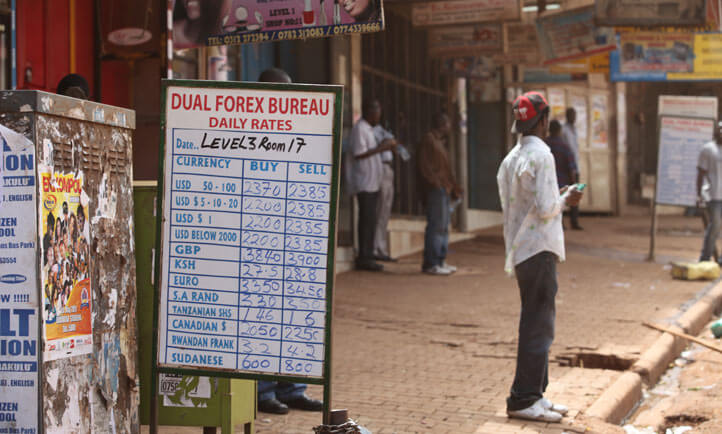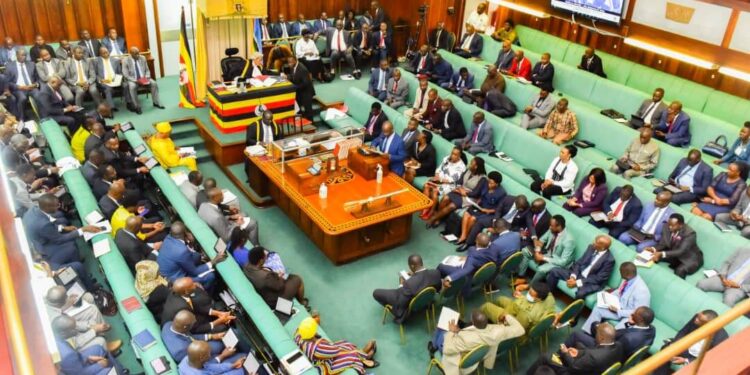The Ugandan Parliament recently passed the Foreign Exchange (Amendment) Bill, 2023, which imposes new regulations on investors in the foreign exchange business.
KAMPALA, UGANDA | NOW THEN DIGITAL — Uganda’s foreign exchange business will undergo significant changes as investors will now be required to meet a minimum paid-up share capital of Shs200 million in order to engage in money transfers.
The Foreign Exchange (Amendment) Bill, 2023, which was passed during a plenary session on Thursday, 29 June 2023, aims to strengthen regulations in this sector.
The bill, chaired by Speaker Anita Among, has sparked discussions about the potential impact on local investors and the need to prevent foreign investors from dominating the market.

Concerns about Limiting Local Investors
Hon. Muhammad Muwanga Kivumbi, a member of the National Unity Platform (NUP) and Shadow Minister for Finance, Planning, and Economic Development, raised concerns about the proposed share capital amount.
He emphasized that the minimum requirement might hinder local investors from participating in the foreign exchange business.
Kivumbi stated that forex bureaus represent an attractive investment opportunity for local entrepreneurs and emphasized the need to ensure fair competition between local and foreign investors.
“Forex bureaus are some of the low-hanging fruits which our people would take interest to invest in. We have to be careful that foreign investors do not out-compete our local investors,” he said.
Fighting Money Laundering
The Chairperson of the Committee on Finance, Planning, and Economic Development, Hon. Amos Kankunda, defended the minimum limit of Shs200 million for money transfers from Uganda to other countries. Kankunda stated that this requirement is crucial in curbing the issue of money laundering.
The committee believes that the amount is reasonable considering the substantial transactions involved in international money transfers. Kankunda argued that businesses engaging in such operations should possess the necessary financial capacity.
“In our opinion as a committee, this money is not so big given the amount of money used to transact this business. We think that by the time you are at the level of international money transfers, you should have that capacity,” said.
Uniform Standards for Investors
Hon. Henry Musasizi, the State Minister for Finance (General Duties), echoed the committee’s stance on the minimum paid-up share capital. He emphasized the importance of uniform standards across all investors in the foreign exchange business.
Musasizi explained that differentiating between local and foreign investors in this sector would be challenging.
He compared the foreign exchange business to other players in the financial sector, such as banks and insurance companies, which comprise both locally and foreign-owned entities. According to Musasizi, capital is equally important for all participants.
“These are players in the financial sector space. We have banks and insurance players there, some of which are locally owned and others foreign-owned. Capital is capital to these players,” Musasizi said.
Increased Minimum Capital Requirement
The bill also proposes an increase in the minimum paid-up share capital for conducting foreign exchange business from Shs20 million to Shs100 million. The committee responsible for reviewing the bill highlighted several factors that influenced this decision.
These factors include market development, the financial strength of license holders, and the necessity of ensuring sustainable business practices. The committee’s report states that the current statutory capital requirement does not align with the practical reality of the foreign exchange business.
Ensuring Business Sustainability
The committee stressed the significance of paid-up capital or shareholder funds in maintaining the sustainability of foreign exchange businesses. Volatility in foreign exchange rates and operating costs can lead to potential losses. To absorb these losses effectively, businesses must possess sufficient capital.
The committee’s report further suggests that serious market participants, who possess the required capital, are unlikely to be deterred by the revised requirement. It implies that the updated regulations will primarily affect potential new entrants.
Additional Amendments in the Bill
In addition to the capital requirements, the Foreign Exchange (Amendment) Bill, 2023 also aims to introduce several other changes. These include the use of technology in foreign exchange operations, the implementation of administrative penalties, and the strengthening of vetting requirements.
The bill also seeks to harmonize the regulatory framework for foreign exchange bureaus and money remittance companies within the East African Community.
The passing of the Foreign Exchange (Amendment) Bill, 2023 in Uganda’s Parliament brings significant changes to the foreign exchange business. With the increased minimum paid-up share capital and other regulatory amendments, the government aims to ensure fair competition, combat money laundering, and promote sustainable business practices. These changes will impact both local and foreign investors, aiming to create a more robust and transparent foreign exchange market in Uganda.
Editor’s Note: If you find any of our content to be inaccurate or outdated, please contact us at press@nowthendigital.com
You’re reading nowthendigital.com — which breaks the news about Uganda, Kenya, Nigeria, South Africa and the rest of the world, day after day. Be sure to check out our homepage for all the latest news, and follow NOW THEN DIGITAL on YouTube, Google, Web Stories, Google News, Medium, LinkedIn, Twitter, Reddit, Pinterest, Linktr, Buy Me a Coffee, and Flipboard to stay in the loop.
















